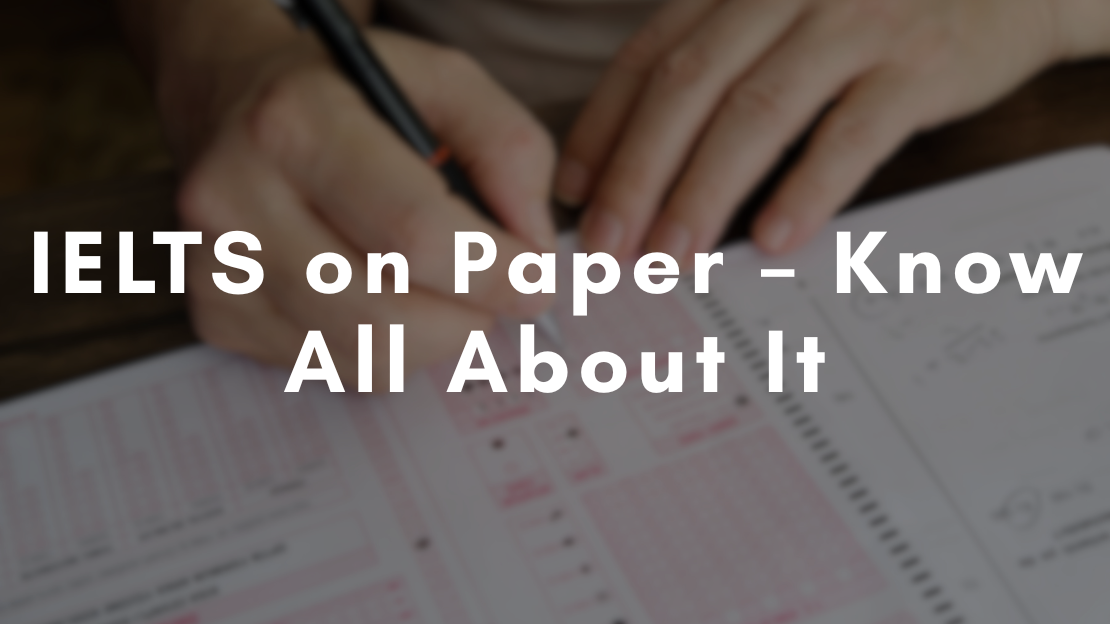 If you are planning to take the IELTS exam soon, you might be wondering whether to choose the paper-based format or the computer-delivered one. Many students preparing at an ielts coaching center in ahmedabad often start by learning the details of both options before deciding which suits them best. In this blog, we will focus on IELTS on Paper, helping you understand everything about it so you can make a confident choice.
If you are planning to take the IELTS exam soon, you might be wondering whether to choose the paper-based format or the computer-delivered one. Many students preparing at an ielts coaching center in ahmedabad often start by learning the details of both options before deciding which suits them best. In this blog, we will focus on IELTS on Paper, helping you understand everything about it so you can make a confident choice.
What Is IELTS on Paper?
IELTS on Paper is the traditional format of the IELTS exam where you complete the Listening, Reading, and Writing sections using a pencil and paper. The Speaking test is done face-to-face with a trained examiner, just like in the computer-based test.
In this format:
- You listen to the audio through headphones and write your answers on a paper answer sheet.
- You read the passages and transfer your answers manually.
- You write your essays and letters directly on paper.
The paper-based test is still a popular choice for candidates who feel more comfortable reading, writing, and managing their work on paper rather than on a screen.
Key Features of IELTS on Paper
Here’s what you can expect when you choose IELTS on Paper:
- Handwritten Answers: You will need to write neatly, especially in the Writing section. Clear handwriting is important because messy writing can lead to lower scores.
- Face-to-Face Speaking Test: Your Speaking test is scheduled either on the same day or a few days before/after your main test.
- Paper-Based Timing: You have to manage your time carefully because there are no automatic timers or reminders.
- Answer Transfer: In the Listening section, you get 10 extra minutes to transfer your answers from the question paper to the answer sheet.
Advantages of IELTS on Paper
Choosing IELTS on Paper has its own benefits, especially for those who are more comfortable with traditional methods. Some advantages include:
- Familiar Feel: Many candidates are used to writing essays and filling out answer sheets by hand from school or college exams.
- Time for Transfer: The extra time to transfer answers in the Listening section gives you a few extra minutes to check your work.
- Real Interaction: In the Speaking test, you interact with a human examiner, which feels more natural and friendly for many candidates.
Things to Consider
While IELTS on Paper is a good choice for many, it’s important to remember a few things:
- Handwriting Matters: If your handwriting is hard to read, it could affect your score. Practicing writing neatly is important.
- Time Management: You need to keep track of time manually during the Reading and Writing sections.
- Booking Early: Paper-based test slots can sometimes fill up faster, so book your test early to secure your preferred date.
How to Prepare for IELTS on Paper
Preparing for the paper-based IELTS test requires a slightly different approach. Here are some tips:
- Practice Writing by Hand: Get used to writing essays and answers on paper within the time limit.
- Work on Handwriting: Make sure your writing is clear, especially in the Writing section.
- Use Practice Papers: Practice with official IELTS sample papers to get used to the paper format and timing.
- Simulate Exam Conditions: Sit down with a timer and a printed practice test to create a real exam-like environment.
- Improve Time Management: Learn to pace yourself so that you can complete all sections within the given time.
Conclusion
IELTS on Paper is a trusted and comfortable choice for many candidates, especially those who prefer working with pen and paper. It offers a familiar test-taking experience with the same scoring and structure as the computer-delivered version. By preparing well and practicing regularly, you can approach the exam day with confidence and give your best performance. Whether you are preparing at an ielts coaching center in ahmedabad or studying on your own, knowing the details about the paper-based test will help you make the right choice for your IELTS journey.
FAQs
1. Is the difficulty level different between IELTS on Paper and IELTS on Computer?
No, the difficulty level, content, and scoring are exactly the same for both formats. Only the method of taking the test is different.
2. Can I use a pen during the IELTS on Paper test?
You must use a pencil for the Listening and Reading sections. For the Writing section, some centers allow a pen, but it is safer to use a pencil unless instructed otherwise.
3. How do I manage time without an on-screen timer?
You will need to rely on the wall clock provided in the exam room. It is important to practice managing your time while preparing.
4. Will I get extra time to transfer answers in the Reading section too?
No, you only get 10 extra minutes to transfer your answers in the Listening section. There is no extra time given for the Reading section.
5. Is handwriting important in IELTS on Paper?
Yes, very much. If your handwriting is not clear, the examiner may not understand your answers, which could lower your score.


